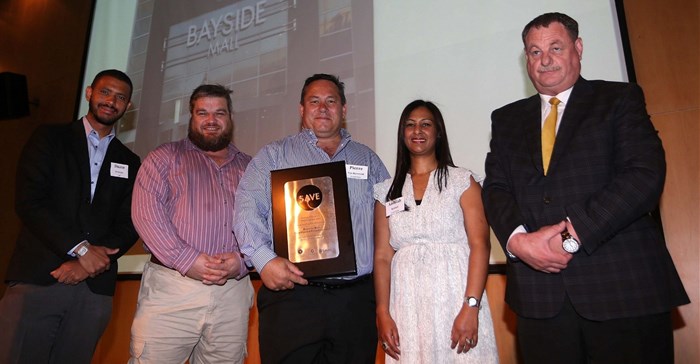Growthpoint Properties' Bayside Mall in Tableview, Cape Town, scooped the award for the Large Building Retrofit Category at the 2015 Energy Efficiency Forum Awards.

Receiving the 2015 Energy Efficiency Forum Award in the Large Building Retrofit category for Bayside Mall in Tableview, Cape Town, were; from left: Duane Petersen of Jefarres and Green (Pty) Ltd; Growthpoint Properties’ Steve Fourie, Pierre van Ryneveld and Aadilah Ryklief; with Cllr Johan van der Merwe, the City of Cape Town’s Mayoral Committee Member for Energy, Environmental and Spatial Planning.
The City of Cape Town, in partnership with Eskom and the South African Property Owners Association (SAPOA), launched Cape Town's Energy Efficiency Forum (EEF) in 2009 to assist commercial buildings and operations in improving their energy efficiency.
Bayside Mall's energy efficiency interventions include upgrades to LED lighting and improvements in the heating, ventilation and air conditioning system. The projects have yielded consistent monthly energy savings averaging at 11% so far, with the hot summer months expected to bump savings up to 17%.
"Winning this award is an exciting achievement. It shows we are on the right track to achieve our own green goals, and we also hope it serves to inspire others to do the same, going beyond what's required to ensure we are resource-efficient and preserve our environment as best we can," says Norbert Sasse, CEO of Growthpoint Properties.
Own energy
Stephan le Roux, Growthpoint's divisional director for retail, says their sustainability projects that produce solar energy, harvest rainwater, and convert waste into energy all make Bayside Mall more self-sufficient by generating its own energy and reducing its waste to landfill.
Bayside Mall's flagship project was a 500kWp pilot rooftop solar photovoltaic plant, with 2,108 panels covering 3,300m². It supplies 5% of the electricity needs in this shopping centre, which spans over 45,000m² of retail space and welcomes in excess of 7.5 million shoppers each year.
"The annual average daily energy production of these panels is 2,100kWh, which equates to the average daily use of 150 households in Cape Town. The installation of the PV panels has also resulted in carbon emission reductions equivalent to 767 tons of CO2," says Le Roux.
The mall has also invested in a rainwater harvesting and reuse intervention. This involves the extraction, detaining, storage and utilisation of storm water run-off from the shopping centre's hard surfaces and rooftop.
Water is screened
"Harvested storm water is screened free of litter, debris and silt before it enters the main storm water holding tanks. Storm water is pumped to elevated tanks at Bayside Mall's back of house area. These tanks have the capacity to hold a total volume of 60kL, with clean storm water pumped to two tanks, positioned above the public toilet blocks and used to fill the toilet cisterns," Le Roux explains.
Storm water is further used for irrigating the mall's landscaping. All this results in a 93% water saving in landscaping and public toilet usage.
The mall's waste-to-energy intervention involves the anaerobic digestion of organic waste that are generated in the shopping mall each day. A waste-to-energy electricity generation plant has been constructed and will introduce a further 250 to 330kWh per day in the near future. This will be fed back into the mall and be used for power in its common areas.






























